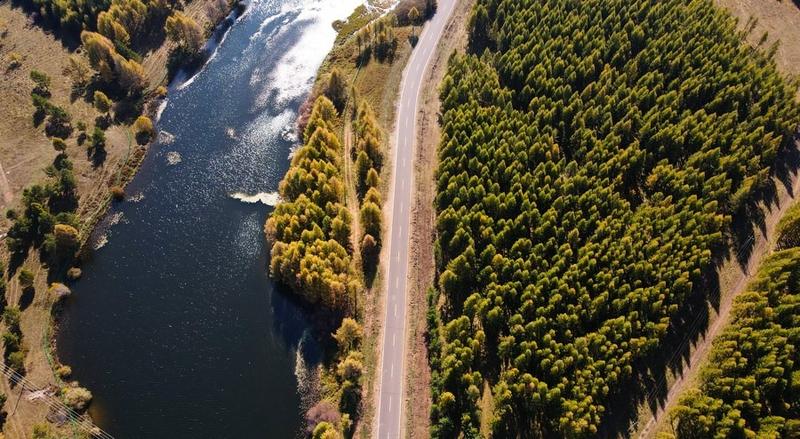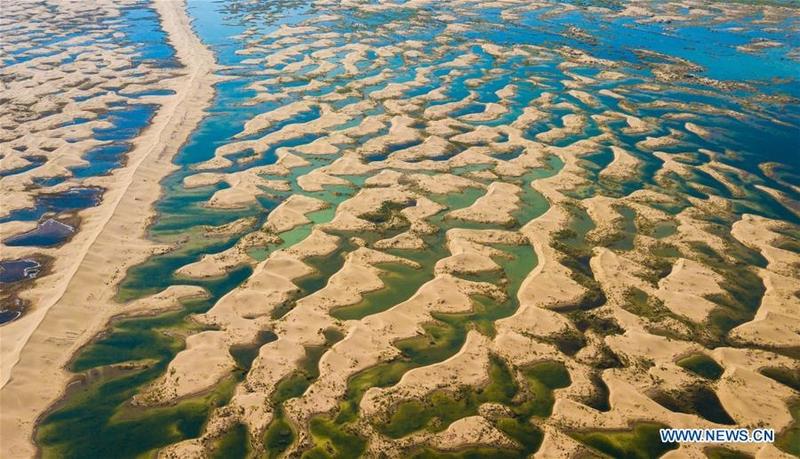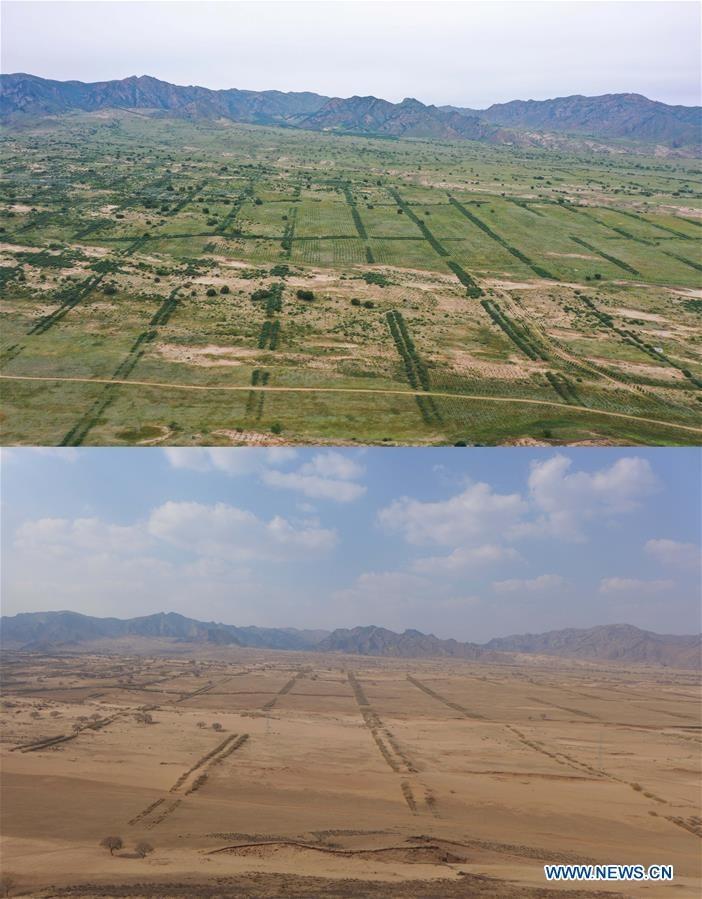 Participants attend a desertification control training workshop, to learn about sand-fixing technologies at a sand prevention demonstration zone in Taklimakan Desert, northwest China's Xinjiang Uygur autonomous region, June 12, 2023. (PHOTO / XINHUA)
Participants attend a desertification control training workshop, to learn about sand-fixing technologies at a sand prevention demonstration zone in Taklimakan Desert, northwest China's Xinjiang Uygur autonomous region, June 12, 2023. (PHOTO / XINHUA)
GENEVA -- World Wide Fund for Nature (WWF) International on Tuesday warned that the world is "failing to make progress towards global forest goals" and set out action plans to reduce deforestation.
ALSO READ: Report: World far off track on pledges to end deforestation
The Swiss-based international non-governmental organization launched on Tuesday its "Forest Pathways 2023" report which sets out a global blueprint to save forests by 2030, and released on Monday the "Forest Declaration Assessment" which reveals the extent of worldwide forest loss in 2022.
Data from the "Forest Declaration Assessment" showed that deforestation reached 6.6 million hectares in 2022, with primary tropical forest loss at 4.1 million hectares, while an alarming 96 percent of global deforestation takes place in tropical regions. Tropical Asia is the only region that is close to the pathway for achieving zero gross deforestation
According to the alarming new data, the world is off track to protect and restore forests by 2030, and failure to meet global forest targets will have catastrophic impacts on the world. Deforestation is continuing at an absolutely alarming rate despite the pledges that have been made by both governments and businesses, said Fran Price, WWF Global Forests Lead.
Devastating facts
Data from the "Forest Declaration Assessment" showed that deforestation reached 6.6 million hectares in 2022, with primary tropical forest loss at 4.1 million hectares, while an alarming 96 percent of global deforestation takes place in tropical regions. Tropical Asia is the only region that is close to the pathway for achieving zero gross deforestation.
READ MORE: Deforestation in Brazil's Amazon falls 66% in August
"Since the global pledge to end deforestation by 2030 was made, we've actually lost an area of tropical forests the size of Denmark. We're even further off track when it comes to tropical forests and two of the largest tropical forest basins, the Amazon and the Congo are facing severe and real tipping points," Price said.
The WWF warned tropical forests are beginning to act as a carbon source, not a sink, under the pressures of a warming, drying and increasingly extreme climate if urgent action is not taken.
Widespread and increasing deforestation and degradation in the planet's three largest tropical forest basins -- the Amazon, Congo and the forests of Southeast Asia -- could deliver a global climate catastrophe.
 This aerial photo was taken on Sept 23, 2021, shows the autumn scenery of the Saihanba forest farm in north China's Hebei province. (PHOTO / XINHUA)
This aerial photo was taken on Sept 23, 2021, shows the autumn scenery of the Saihanba forest farm in north China's Hebei province. (PHOTO / XINHUA)
"Forests are critical to meeting all of our global goals, from the Paris Climate Agreement to the global biodiversity framework to the Sustainable Development Goals," Price told Xinhua.
"If we further lose our forests, we will further undermine our climate stability, our water cycles, our regional and global agricultural economies, and then our food security, our livelihoods, our societies, also unravel if we reach those tipping points in these critical places. We need to change this if we want a better future for our planet and our children," she said.
Measures needed
Globally, at least 100 times more public funding goes to environmentally harmful subsidies than to finance for forests, and only $2.2 billion in public funds are channeled to forests every year, a negligible fraction compared to other global investments, said WWF.
 This aerial photo taken on June 9, 2018, shows wetlands formed by water of the Yellow River in flood period at the Kubuqi Desert in Hangjin Banner, north China's Inner Mongolia autonomous region. Kubuqi, the seventh largest desert in China, is a good example of China's success in alleviating desertification. About 6,460 square kilometers of the Kubuqi desert have been reclaimed in the last 30 years. (PHOTO / XINHUA)
This aerial photo taken on June 9, 2018, shows wetlands formed by water of the Yellow River in flood period at the Kubuqi Desert in Hangjin Banner, north China's Inner Mongolia autonomous region. Kubuqi, the seventh largest desert in China, is a good example of China's success in alleviating desertification. About 6,460 square kilometers of the Kubuqi desert have been reclaimed in the last 30 years. (PHOTO / XINHUA)
A fundamental shift is needed in how we value forests, one which recognizes the multiple values that forests have for people, nature and climate, the report said, noting that forested nations need a fair share of forest finance to protect their standing forests.
A fundamental shift is needed in how we value forests, one which recognizes the multiple values that forests have for people, nature and climate, the report said, noting that forested nations need a fair share of forest finance to protect their standing forests
The international actors that preside over trade and financial flows from major tropical forests need to become the sustainable changemakers halting primary tropical forest conversion and degradation and delivering sustainable forest management and deforestation and conversion-free production and trade, said the report.
READ MORE: Amazon River falls to lowest in a century amid Brazil drought
"We need to mobilize financial flows. Business is a key lever, both public and private, we need to repurpose harmful ones to support green and sustainable forest economies and trade," Price said.
In addition to calling for financial promises to be met, the "Forest Pathways 2023" report set out a blueprint to save forests by 2030, with measures including ending forest-harming investments and subsidies, reforming the rules of global trade that harm forests, removing barriers to forest-friendly goods, and accelerating the recognition of land rights to Indigenous peoples.
"Measures need to be taken by many across the spectrum, by national governments, by sub-national governments, by international bodies by companies and the private sector, by civil society and NGOs and the public," Price said.
Our call to action is for governments and businesses to get on track, make good on their public commitments to halting forest loss, protecting, sustainably managing, and restoring forests and to start making continuous and meaningful annual progress towards our forest goals, said WWF.
 This combo photo shows the different views of the same area near the Xar Moron River in Hexigten Banner, north China's Inner Mongolia autonomous region, the top one was taken on Aug 12, 2020, showing the progress after the desertification control work, and the bottom one was taken on April 5, 2017, showing the situation before the desertification control work. (PHOTO / XINHUA)
This combo photo shows the different views of the same area near the Xar Moron River in Hexigten Banner, north China's Inner Mongolia autonomous region, the top one was taken on Aug 12, 2020, showing the progress after the desertification control work, and the bottom one was taken on April 5, 2017, showing the situation before the desertification control work. (PHOTO / XINHUA)
China’s contribution
China has made sustained efforts to combat desertification over the years, putting the brakes on desert expansion and contributing to global ecological conservation, said the organization.
On Oct 18, Chinese President Xi Jinping announced eight major steps China will take to support high-quality Belt and Road cooperation. According to the fourth step, China will continue to promote green development and step up support for the BRI International Green Development Coalition
During the 2012-2022 period, China's accumulative afforestation area reached 960 million mu (64 million hectares), while 165 million mu (11 million hectares) of grassland was improved, and more than 12 million mu (0.8 million hectares) of wetlands were added or restored, official data showed.
READ MORE: China inspires global green development with desert control
From encouraging public participation to implementing policy measures, the country has taken effective and practical steps to curb desertification, turning barren soil into forests and grasslands.
"China has done an absolutely amazing job in reforesting and protecting natural forests domestically, and in planting new ones. And there was actually a blip up on global restoration numbers because of their efforts some years ago," Price said.
It will be impossible to successfully tackle the drivers of deforestation without China's help and drive in this effort, she said, adding "We feel that China can do the same in countries where it has critical economic ties, especially through its Belt and Road Initiative and the proposal to set up a global network for sustainable forest management."
READ MORE: Tongliao tackles desertification
On Oct 18, Chinese President Xi Jinping announced eight major steps China will take to support high-quality Belt and Road cooperation. According to the fourth step, China will continue to promote green development and step up support for the BRI International Green Development Coalition.
China will also implement the Green Investment Principles for the Belt and Road, and provide 100,000 training opportunities for partner countries by 2030.


